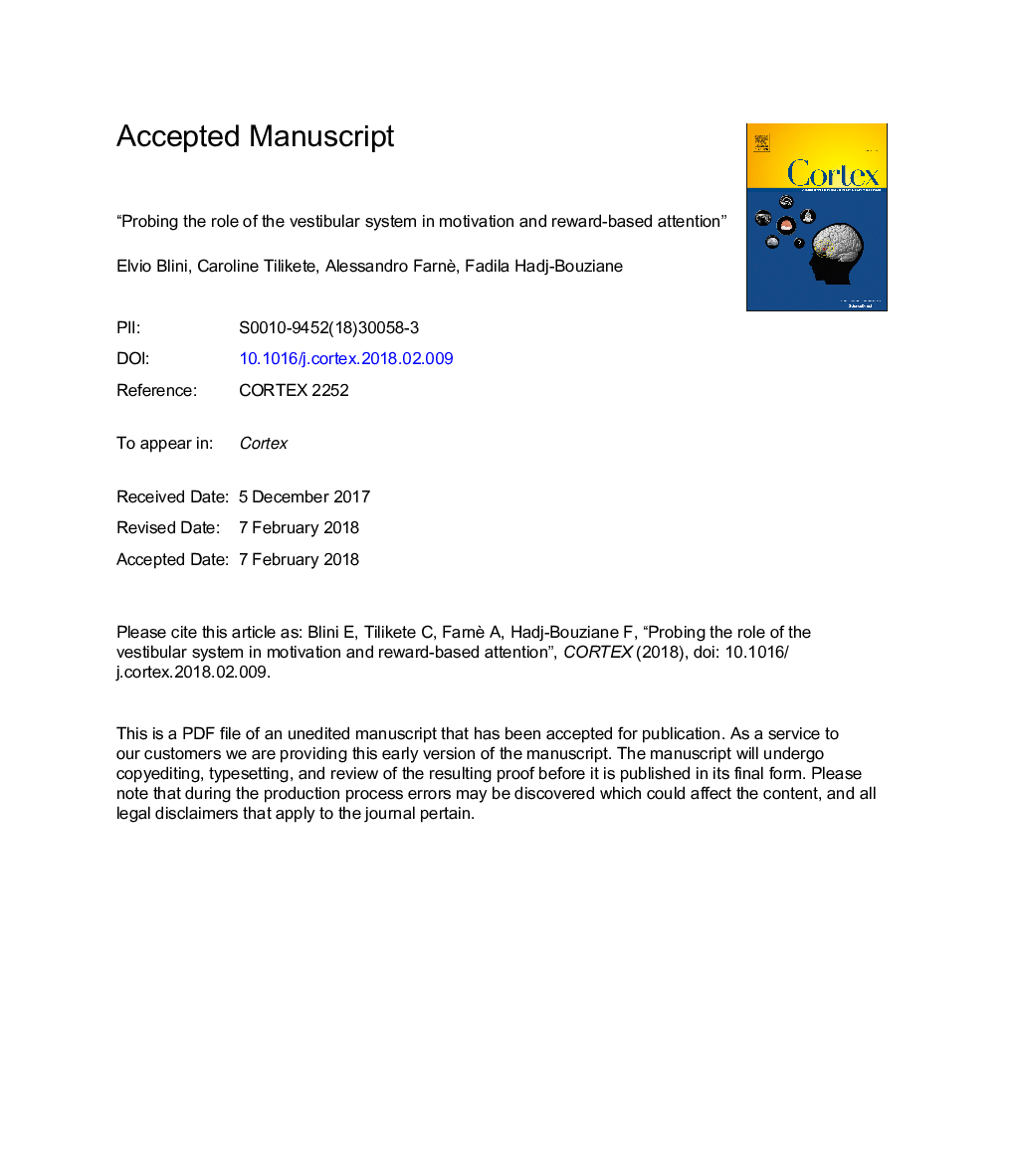| کد مقاله | کد نشریه | سال انتشار | مقاله انگلیسی | نسخه تمام متن |
|---|---|---|---|---|
| 7311738 | 1475429 | 2018 | 60 صفحه PDF | دانلود رایگان |
عنوان انگلیسی مقاله ISI
Probing the role of the vestibular system in motivation and reward-based attention
ترجمه فارسی عنوان
بررسی نقش سیستم ویستیبولار در انگیزش و توجه به پاداش
دانلود مقاله + سفارش ترجمه
دانلود مقاله ISI انگلیسی
رایگان برای ایرانیان
کلمات کلیدی
Addiction - اعتیاد Motivation - انگیزشVestibular stimulation - تحریک VestibularBrain stimulation - تحریک مغزیgalvanic vestibular stimulation - تحریک وستبولا گالوانیکیSpatial attention - توجه فضاییAttentional capture - ضبط ذهنیanterior cingulate cortex - قشر سینگولیت قدامی، کورتکس سینگولیت قدامیReward - پاداش
موضوعات مرتبط
علوم زیستی و بیوفناوری
علم عصب شناسی
علوم اعصاب رفتاری
چکیده انگلیسی
The vestibular system has widespread connections in the central nervous system. Several activation loci following vestibular stimulations have been notably reported in deep, limbic areas that are otherwise difficult to reach and modulate in healthy subjects. Following preliminary evidence, suggesting that such stimulations might affect mood and affective processing, we wondered whether the vestibular system is also involved in motivation. Evolutionary accounts suggest that visuo-vestibular mismatches might have a role in preventing the search for and exploitation of goods that previously resulted in aversive reactions, as they would be a fine warning signal which follows the contact with or ingestion of noxious neurotoxins. The first question was thus whether vestibular stimulation alters sensitivity to reward. Secondly, we sought to assess whether attention is allocated in space differently when cued by highly motivational stimuli, and if this interplay is further modulated by the vestibular system. In order to evaluate both motivational and attentional assets, we administered a Posner-like cueing task to 30 healthy subjects concurrently receiving sham or galvanic vestibular stimulation (GVS; Left-Anodal and Right-Anodal configurations). The participants had to discriminate targets appearing in either exogenously cued or uncued locations (50% validity); cues predicted the amount of points (0, 2, or 10) and thus money that they could earn for a correct response. The results highlight a robust inhibition of return (IOR) (faster responses for invalidly-cued targets) which was not modulated by different levels of reward or GVS. Across all stimulation sessions, rewards exerted a powerful beneficial effect over performance: reaction times were faster when rewards were at stake. However, this effect was largest in sham, but greatly reduced in GVS conditions, most notably with the Right-Anodal configuration. This is the first evidence for a decreased sensitivity to rewards causally induced by a perturbation of the vestibular system. While future studies will shed light on its neural underpinnings and clinical implications, here we argue that GVS could be a safe and promising way to enrich our understanding of reward processes and eventually tackle the management of patients with aberrant sensitivity to rewards.
ناشر
Database: Elsevier - ScienceDirect (ساینس دایرکت)
Journal: Cortex - Volume 103, June 2018, Pages 82-99
Journal: Cortex - Volume 103, June 2018, Pages 82-99
نویسندگان
Elvio Blini, Caroline Tilikete, Alessandro Farnè, Fadila Hadj-Bouziane,
